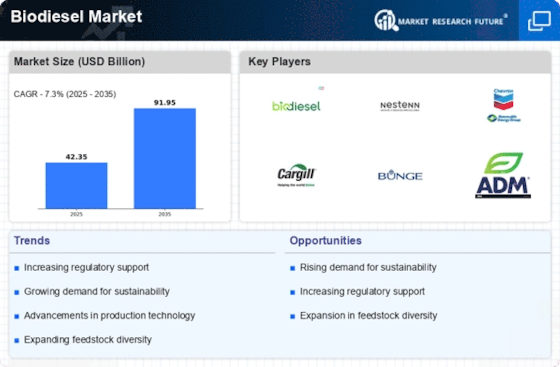Market Trends
Key Emerging Trends in the Biodiesel Market
The world's transition to more environmentally friendly and sustainable energy sources is causing the biodiesel industry to see dynamic developments. As awareness of environmental sustainability and climate change grows, biodiesel is becoming a competitive alternative to conventional fossil fuels. The growing emphasis on feedstock variety is one notable development in the biodiesel industry. Historically, soybean and rapeseed oils have been the primary raw materials used to make biodiesel. There has been a discernible movement, nevertheless, towards the investigation of substitute feedstocks, such leftover cooking oil, algae, and animal fats. This diversification not only helps in mitigating the impact on food crops but also addresses concerns related to land-use change and deforestation. Another significant trend shaping the biodiesel market is the emphasis on technological advancements in production processes. Continuous research and development efforts are being made to enhance the efficiency of biodiesel production, reduce production costs, and increase overall yields. Cutting-edge technologies that have the potential to expedite production and enhance sustainability overall, including enzymatic transesterification and in-situ biodiesel synthesis, are drawing interest. These technical advancements are essential to increasing the competitiveness and economic viability of biodiesel as an energy source. Policies and regulations from the government are crucial in determining the developments in the biodiesel business. Mandates and incentives for biofuel are being implemented by several nations to encourage the use of biodiesel. The objectives of these policies are to lower greenhouse gas emissions, improve energy security, and aid in the creation of a sustainable energy infrastructure. Global governments' continued emphasis on environmental objectives is expected to fuel additional expansion and investment in the biodiesel industry. Consumer awareness and preferences are also influencing the biodiesel market. As customers become more conscious of living sustainably and making eco-friendly decisions, they are becoming more interested in biodiesel as a cleaner fuel substitute. It is anticipated that as more customers prioritise goods and services that are in line with their environmental ideals, the market for biodiesel would increase. Businesses are being forced by this shift in customer behaviour to invest in renewable energy sources like biodiesel and embrace more sustainable practices. The biodiesel industry is seeing growth and innovation due to global partnerships and collaborations. Businesses are collaborating with academic institutions, governmental organisations, and other relevant parties to investigate novel prospects, exchange insights, and jointly tackle obstacles within the biodiesel sector. These partnerships advance the creation of innovative technologies and increase the capacity for producing biodiesel globally. The biodiesel industry still faces difficulties in spite of the encouraging developments. Concerns regarding the overall environmental effect of biodiesel production, competition from alternative biofuels, and fluctuating feedstock prices are all issues that need constant attention. However, it is anticipated that the biodiesel market will move towards a more robust and sustainable future due to the industry's dedication to tackling these issues and the ongoing backing of both consumers and governments.


















Leave a Comment